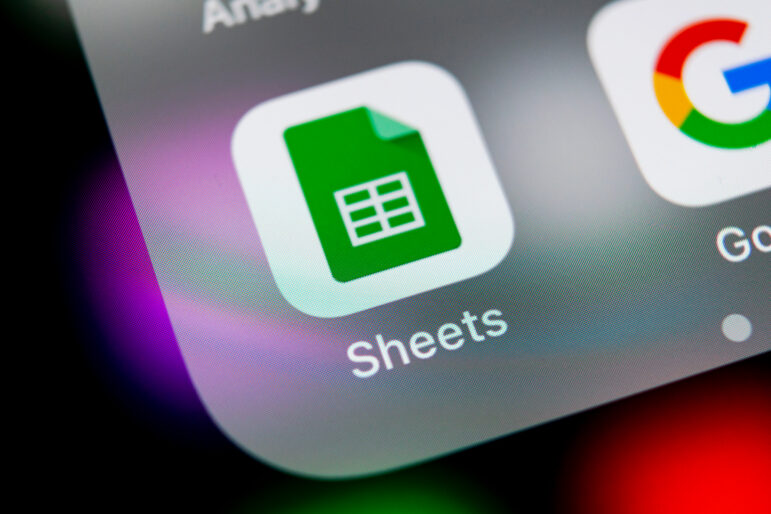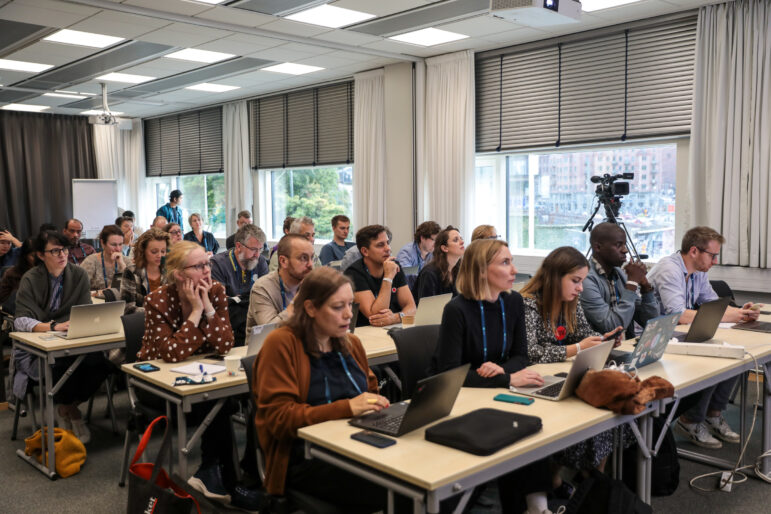Chapter Guide Resource
Introduction to Investigative Journalism: Data Journalism
As the use of the internet spread and increasing amounts of data emerged, the term “data journalism” arose to describe reporting powered by data and analysis.
GIJN’s Resource Center is here to help journalists expand their knowledge and skills. The Center holds more than 2,000 items in 14 languages – from tip sheets and guides to instructional videos. Use the menu on the right to navigate it or the search box below to find topics you’re interested in.
As the use of the internet spread and increasing amounts of data emerged, the term “data journalism” arose to describe reporting powered by data and analysis.

Knowing how to use spreadsheets is a crucial skill, as it allows you to find potential stories in large amounts of data and to think critically about how to use it.

Investigations into what happens on, under, and around the ocean can often be answered thanks to the vast amount of data available online.

Knowing where to look for data — and accessing it via scraping data from websites — can be a powerful force multiplier for investigative journalists.
This roundtable will conclude the data track of the conference with a discussion on the tools that are coming to the forefront for doing data stories and with predictions for what is ahead. Join us with your ideas for what is next. ———————– The Global Investigative Journalism Network is an international association of journalism organizations […]
Pinpoint is a powerful tool for converting unstructured data (text and other forms of messy data) into datasets that can be analyzed and used for stories. ⚠️ Warning for first-time Pinpoint users: In your web browser you need to be logged into a gmail.com account. Open another tab and go to the following site https://journaliststudio.google.com/pinpoint/about. […]
Watchdog reporting makes a critical contribution to society by exposing wrongdoing, fighting corruption, and promoting accountability. But how do we measure this, and explain the value of investigative reporting to a skeptical public (and donors)? At a time of unprecedented attacks on the press, a broken financial model, and low public trust, it is critical […]
Programs to train and teach investigative reporting have spread worldwide, but how effective are different methods and styles? For this panel, we bring together educators and trainers from diverse environments in France, Slovenia, South Korea, and the United States for a look at both traditional and innovative techniques. ———————– The Global Investigative Journalism Network is […]
This hands-on class will deepen your reporting skills by using QGIS, a free, popular mapping program. More than pretty pictures, mapping programs help you uncover stories and discover important patterns. Crime, health, and environment are just some beats that benefit by knowing mapping skills. In this class you will get familiar with using QGIS and start doing fundamental analysis using real-life data.
Governments and corporations worldwide are quietly deploying AI technologies that can discriminate and harm the most vulnerable members of society. Yet the impact of predictive and surveillance technologies on communities around the world often goes unreported and remains invisible. How can we bridge the gap? And what is the best way to investigate AI? In […]
Think there’s no data in your story? Create your own. Journalists can use polls, physical surveys, documents, or even monitoring devices to create their own data. We’ll give you examples of how these techniques are used and some best practices for doing it yourself. ———————– The Global Investigative Journalism Network is an international association of […]
This session will provide an overview of social network analysis, which is used to visualize and analyze such things as the connections between companies and individuals in organized crime and money laundering, the paths and progress of infections in pandemics, interlocking directorships of corporations, and the structure of terrorist organizations.
In this edition of GIJN Toolbox, we examine the latest advancements from the IRE22 conference on data extraction and optical character recognition (OCR) tools for turning unwieldy documents into searchable spreadsheets.
At the NICAR22 conference in Atlanta, Georgia, journalism trainer MaryJo Webster offered a series of basic tips for editors who have little to no data analysis skills.

Since her arrival at Runrun.es, Lisseth Boon has conducted investigations on human rights violations, gold trafficking, illegal mining, and environmental crimes, many of them recognized with national and international awards. Her team has also worked with media platforms both inside and outside of Venezuela such as Consejo de Redacción and Connectas in Colombia, Convoca in Perú, and Mongabay. It has also participated in transnational collaborative projects such as the Panama Papers, Fincen Files, Swiss Connection, Lava Jato (Operation Car Wash), Vigila La Pandemia, and Tierra de Resistencia.
Our curation of the most prominent data centers in Africa.
Looking to learn a new programming language or improve your spreadsheet skills? These online vendors offer free or low-cost online courses and video tutorials on a variety of topics and languages. Check GIJN’s YouTube page for the free webinars. The Social Data School, led by Cambridge Digital Humanities in association with the Minderoo Centre for […]
There are a plethora of programs available for data visualization. Some are very simple to use and require no coding, while others are more difficult to learn but offer greater flexibility and interactivity. Here are some of the most popular options for journalists. ArcGIS online is a tool from Esri to create and share online […]
Once you’ve done your analysis, you may want to create graphs, charts, or maps to display your results. Here are some resources to help you display your data in visually appealing, reader-friendly formats. Flowing Data offers a plethora of tutorials that will help you visualize your data. You’ll learn how to make cartograms, upset plots, […]
R is a popular programming language most commonly used for data cleaning, statistics, and data visualization. Both the R program and R-Studio are open source. Below are some books and online resources to get you started. Many of the online vendors listed under “Training Courses” offer free or low-cost classes in R. Datajournalism.com offers this […]
If you have a dataset involving geographic locations, these tools and tipsheets can help you analyze your data using maps. The most commonly used mapping programs in newsrooms are ArcGIS from Esri (which has free options for journalists) and the open-source program QGIS. Some also are useful for visualizing, but we’ve added a separate list […]
Python is one of the most popular programming languages for data journalists, and it is useful for scraping websites as well as cleaning and analyzing data. Here are some resources for learning to code in Python. A Byte of Python is an online book dedicated to the basics of Python. It is targeted at those […]
SQL is a commonly used language for working with databases. It is particularly useful for working with larger datasets that can bog down Excel and for joining separate datasets for analysis. Several open-source versions are used in newsrooms, including Postgresql and DB Browser for SQLite. Here are some tips on how to get started. This […]
Spreadsheets often are the first data tool journalists learn to use. They come in handy for cleaning and analyzing data in structured formats such as .csv files. Microsoft Excel and Google Sheets are the most commonly used spreadsheets. Below are some resources to help you navigate Excel and improve your spreadsheet skills. Data Journalism Training: […]
Got dirty data or pesky PDFs? These programs can help you get your data into a format you can use. OpenRefine is a free tool for exploring, cleaning, and matching data. It is particularly useful for dealing with messy data. It is available in English, Chinese, Spanish, French, Russian, Portuguese (Brazil), German, Japanese, Italian, Hungarian, […]
Once you have your data, check out these free online tipsheets and tutorials for advice on how to inspect and clean it before you start analyzing. This story is a great example of what to do when there are gaps in terms of the data available from official bodies (2021). Data Biographies: How to Get […]
Government bodies often have mechanisms that allow journalists and members of the public to request data and documents. Below are some resources to help you understand the public records laws where you live and draft successful records requests. The National Freedom of Information Coalition is a US nonprofit organization that has a guide to international […]
These conferences can provide opportunities to network, learn new techniques, and discuss story ideas with fellow data journalists. The Centre for Investigative Journalism Summer Conference includes sessions on data journalism from leading practitioners. Data Harvest is held in conjunction with the European Investigative Journalism Conference. The next one is scheduled for 19-22 May 2022 in […]